- Home
- Sarah Lean
A Dog Called Homeless Page 2
A Dog Called Homeless Read online
Page 2
“One more volunteer?” Miss Steadman asked.
Then I saw her eyes flick across to me. They silently said, Not you, Cally Fisher, not you. You can’t do it.
I’d seen the same disappointed, disbelieving eyes look at me like that the weekend before at the cemetery. Then she looked away, just like Dad had done. Sometimes you just have to prove people wrong. Sometimes you just want someone to believe you’re more than they think you are. Plus there was also the fact that the sneaky traitor Mia was about to put her hand up.
I reached over and held Mia’s arm down and shot my hand in the air. I ignored the giggles and whispers, the feet reaching out to nudge each other. I ignored Daniel Bird’s loud “Ha!” and Mia’s gaping mouth.
Jessica and Harry looked at Miss Steadman, pencil poised, not writing my name on their list. Miss Steadman shushed the murmurings and giggling and looked out of the window. Then she looked in the register as if she was checking for something. Her mouth twitched. She took a deep breath and straightened her back.
“What we need is—”
“It’s for an important cause,” I said quickly.
Just then I saw Daisy whispering to Mia. I saw Mia smirk and fold her arms, her eyes going narrow.
I straightened my arm, zipped my lips. Miss Steadman leaned back into her chair. I saw her heart go soft.
“What we need is people like you, Cally, who are willing to take up the challenge. Thank you, you can put your hand down now.”
She nodded to Jessica as if to say why aren’t you writing her name down already?
“Everyone else can be involved by sponsoring our volunteers. You will need to ask your parents. Remember what the money is for.”
She closed the register, kept her eyes on me.
“And our volunteers are going to need your support, not just with sponsorship money. You’re all going to have to encourage them to stay quiet.”
MRS BROOKS, THE SPECIAL NEEDS LADY, wanted to see me. She deals with all the problems – if you can’t do maths or English, if you’re in a wheelchair, or if you are the problem. She’s a tall lady with plum-coloured hair, orangey lipstick and an orangey tan. She looks like she’s just come out of a hot pan. Her perfume made it difficult to breathe around her.
For a while after Mum died she let me sit with her and draw pictures. She said I could talk about anything I wanted. But mostly she did the talking, mostly in riddles.
“I hear you’ve volunteered for the sponsored silence,” she said.
“Miss Steadman said I could.”
“Yes, she did. And we’ll all support you.”
She ran a finger round the gold chain on her sunglasses which she wore on her head all year, even inside school. She tilted her head and smiled.
“Well, I want you to know if for any reason you don’t feel you can manage a whole day of silence, then Mia Johnson has very kindly volunteered to do the morning.”
She reached out to touch my arm. I hate it when people look sorry for you. I hate it when they look at you like you’re hopeless.
“Perhaps you could each do half the day?” she said.
“I can do it,” I said.
“She’s just being a good friend—”
“I can do it all day!”
She signed my sponsorship form and said if you change your mind… without finishing her sentence.
She leaned back in her chair and held her sunglasses up to the light.
“I remember you in Year Four,” she said, huffing on the lens. “You were a lovely little girl who used to get on with people. You worked really hard to remember all your lines and songs for Charlotte’s Web. And I’m sure you would have been brilliant again last year…”
She poked me with her orange fingernail. “Wouldn’t it be nice to have the old Cally back?”
I told you she talked in riddles. And you can’t go back. There’s no such thing as time machines. Ask Daniel Bird.
“I’ve never been old,” I said.
Not like her. That wouldn’t be for at least another eighty years.
“What I meant was—”
“You mean I used to be good and nice and now I’m not.”
“No, of course not. What I meant was you’ve had some difficult challenges. Things happen in our life that can change us, make us unsettled.”
She sighed. “It was such a shame you had to pull out of the show last year. Such terrible timing.”
And the reason she said that was because I was supposed to be playing Olivia in the musical called Olivia!, which is just like Oliver Twist but with a girl. But because the show was only two days after the accident when Mum died, everyone said I shouldn’t. Daisy had stepped in.
Mrs Brooks put her glasses back on her head and pulled a black file off the shelf. It said Year Six Assessments on the side. She flicked through the file, running her finger along pages to find my name, and tapped the page slowly.
“Perhaps it would be better to think about the future, a fresh start. I hope you’re going to be singing in the farewell concert.”
And on she went.
I hadn’t put my name down for the concert yet. I looked past her, out through the dusty window, across the wide playing field.
And there she was. Mum came through the open gates. She walked across the grass and headed for the lunch benches at the front of the school, like she’d had some good news, but didn’t want to rush to tell anyone. Mum was wearing her red raincoat again and looked like the only red apple in a tree.
I stretched myself as tall as I could to see over Mrs Brooks’s wide shoulders while she jabbered on.
“Sitting up straight is a good place to start,” Mrs Brooks said. “You look more grown-up already.”
I waited until she went back to the file and the jabbering then leaned to the side to see better. I so wanted Mum to see me. And even though there was a playing field and the school walls and window between us, Mum turned her head, as if she knew I was looking, as if I’d called her name. She turned. She waved. Not like she was saying goodbye, but like she was saying Hello, it’s me again.
“Did you want to ask something?” said Mrs Brooks, seeing me with my arm in the air.
“No,” I said. And then, “Can I go to the toilet?”
Mrs Brooks looked out of the window over her shoulder. She didn’t see Mum; she didn’t see anyone there.
“Be quick,” she said.
My heart pounded as I passed the loos. My breathing was so loud and fast I thought that everyone could hear me, but I didn’t even look up to see if anyone in the office saw me go out of the doors at reception.
Mum walked towards me, and now she wasn’t alone. Her eyes followed a huge silver-grey dog playing around her. Its head was as high as her waist and she rested her hand on its silver-grey shoulders.
Mum looked at the dog and then she looked up at me.
“Stop right there, Cally Fisher!”
Mr Brown, the head teacher, and Mrs Brooks were running across the playing field.
Mrs Brooks shouted again, “Stay where you are! Don’t move!”
Her sunglasses bounced off her head and fell on the grass, but she kept coming.
And when I looked around to see where Mum had gone, the enormous dog came running right up close to me and I saw into his soft brown eyes. His ears were up and his curved tail swayed and he looked straight at me, like he was saying, “It’s you! I want to be with you!”
I thought, That dog’s not a ghost, it’s really real.
And just as Mr Brown came closer, the dog changed direction and galloped away. He raced around Mrs Brooks and snatched up her sunglasses and dropped them again, daring her to take them. I could hear her saying, “Nice doggy,” and, “There’s a good doggy,” and then, “Can somebody get some more help!”
His stride was so big nobody could catch him. By the time they were all red in the face and more people from the office had come out to help, the dog had jumped over the fence and run away with Mrs Brooks’s
sunglasses.
Then Mrs Brooks had my elbow and was taking me back to her office.
“I’ll deal with this, Mr Brown,” she called. “What on earth did you think you were doing, Cally? I think we need to have another chat.”
But there wasn’t time. Daniel Bird was standing in the doorway of her office poking bits of Blu-tack into the door catch while he waited for his session.
“What’s she done now?” he said.
I still had a picture of Mum and the dog in my mind, clear and bright and beautiful. And all I could think was that they’d both come to me, without me even asking.
I TOOK THE SPONSORSHIP FORM HOME. LUKE signed it. My brother’s thirteen. He looks like my mum; he’s got her thick brown hair and he’s just about as tall as she was. But he’s serious and boring.
I get on Luke’s nerves. I have to. He spends a lot of time in his room on his own, racing cars on his computer. His ambition is to beat someone called Sting who has the highest score. He tells me to shut up all the time; he can’t break records and reduce his lap times with me banging about in the background. Dad tells me to leave him alone. He says you have to give a man a bit of peace and quiet. I remember Mum used to say she liked noise in the house. She said, “When the kids are quiet, you know there’s trouble.” But Dad doesn’t seem to remember anything she used to say.
Luke calculated sponsoring me probably wouldn’t cost him much. But he said it would be worth every penny. “I wish it was forever,” he said.
Be careful what you wish for, that’s what Mum would have said.
“Dad, guess what?” Luke said, flinging the form miles away from my hands. “I’ve taken 1.4 seconds off my lap time.” He slid over the back of the sofa and sat next to Dad, slumping his feet on the table.
“Hmm?” said Dad.
“And that was in heavy rain.”
“Good for you,” Dad said, without looking away from the TV. “Take your feet off the table. And sit down, Cally. I’m trying to watch this.”
When Inspector Morse finished, I showed Dad the sponsorship form. He hesitated then read the details.
“Sponsored silence, eh?”
“Miss Steadman said I could do it.”
“She did?”
“And Mrs Brooks.”
“Good old Mrs Brooks,” he muttered. Which isn’t what he usually said about her. “Next Tuesday?”
“All day. Why?”
“Nothing. There’s a meeting at work. I’m going to be late home, that’s all.”
He wrote fifty pence in the box on the form that said how much you were going to pledge for each hour of silence. Then he looked at the telly again.
“Dad,” I said, “I saw Mum again. She came to school.”
He closed his eyes and rubbed his eyebrows, shook his head.
“She brought a dog with her.”
Dad crossed out the fifty pence and changed it to a pound. “Time for bed,” he said.
I watched him flick the channels to find another detective programme. He liked mysteries; he liked to try to guess whodunnit.
AT SEVEN O’CLOCK ON TUESDAY MORNING I LAY in bed thinking about my mum and the giant silver dog. In my daydream I said, “Mum, where are you?”
And she said, Hello, Cally, I’m right here.
And I said, “Where?”
And she said, About an inch away.
I felt her nearness, but I couldn’t see her. I opened my eyes.
I watched the dust fairies trapped in a stream of sunlight between the curtains. Little pieces of almost nothing that disappeared when the sun went in. Slowly and silently they turned, undecided about which way to go. They coasted and floated. I whispered to them because they were small and fragile. “Make up your mind,” I said. Then I blew on them and soon they were whirling away.
Dad came in. Same old checked shirt with the ink stain on the pocket, same old crumpled work trousers. Same old messy hair and beard, dark and speckled with grey, like he’d been out overnight in a frost.
“You awake?” he said.
He picked my school clothes off the floor and put them on the end of my bed. He stood there a minute.
“You’ve got that charity thing today, haven’t you?”
“Sponsored silence,” I said.
It was nice that he remembered. He was so forgetful these days. He forgot he had to do the ironing. He forgot to shave. He forgot to pay the phone bill and it took weeks for them to connect us up again. He was just like a raggedy old bear still sleepy from hibernating over winter. Except winter was ages ago.
He used to be a different sort of Dad, always joking about with Luke, rough and tumbling on the sofa. He always helped me with maths homework, straight after tea. He’d show me how to do a question, then he’d do a bit and I’d finish it, until I could do it by myself. You could sit on his lap and he’d listen to you tell him anything.
I climbed out from under the bedcovers and stood up on the bed so I was as tall as him. I held his face in my hands, like he used to do to me. I wanted to say something about Mum, to say remember when… remember? Like I’d already asked a thousand times. I searched his eyes, looked to see if Mum was in there. But it was like the morning after there’s been heaps of snow and you can’t tell what’s underneath any more.
So I said, “Dad? What if I can’t help it and I say something?”
He squeezed me. “I won’t mind. You’ll be doing your best.”
He went off in a dream, opened the curtains, sent the dust fairies into the shadows.
So that was it. My best didn’t sound like much. He was just the same as all the others who didn’t think I could do it.
“I’ll mind,” I whispered to the invisible spinning dust. And those were my final words.
I STARTED MY SILENCE AT FOUR MINUTES PAST seven.
At half past seven when Dad said, “Cornflakes or Rice Krispies?” I put my finger across my lips and waited until he turned round to see why I wasn’t answering.
“Getting a bit of practice in?” he said, taking both boxes from the shelf. “Don’t forget I’m going to be late home. There’s a couple of tins of spaghetti in the cupboard.”
At eight o’clock I jangled the coins in my pocket when he asked if I had my bus money. Luke rolled his eyes and tutted.
After registration the sponsored silence volunteers were excused from answering any questions in lessons. Everyone was asked not to distract us.
By ten o’clock Miss Steadman was already looking impressed.
At break-time nobody seemed to mind I wasn’t playing.
At half past twelve all of us volunteers sat on the benches outside to eat our packed lunch in silence. I could see through the tall glass doors into the hall. Mr Crisp the music teacher was auditioning people for the farewell concert. I saw Mia and Daisy standing on the stage together, their mouths opening and closing.
During RE Mrs Brooks came in and winked at me.
At quarter to three Miss Steadman was looking proud. She told us we were all going to a short assembly with Mr Brown.
I’d done it. I’d proved them wrong – Miss Steadman, Mia, Daniel and all the rest of them who didn’t think I could do it. And it should have been over at three o’clock. Only I wasn’t just happy that some poorly children might get to go to Disneyland. The day had passed and I’d not been in trouble, not fallen out with anyone, nobody told me to be quiet. Nobody said anything to me at all.
The twenty-four sponsored silence volunteers were called to the front of the assembly. Children clapped and cheered while Mr Brown showed some pictures of happy children from the Angela’s Hospice website on the screen. He praised us for meeting a difficult challenge, said he would add up the sponsorship money when it was collected and let us know the total by the end of the following week.
“The children from Angela’s Hospice will be very grateful,” he said. “Your silence has helped make their wishes come true. Now you may speak.”
There were big whoops from the other vo
lunteers, coughing and gabbling like mad, saying things like, “That was soooo hard,” and, “I nearly said something when...”
The talking and laughing bubbled everywhere. I wanted to say something. But there was only one thing on my mind, only one person I wanted to say it to. And I could say it inside, could say it without anyone hearing: “Mum, did you find that dog in heaven?”
SATURDAY MORNING ME, LUKE AND DAD TOOK the bus into town. Dad told us to wait outside the bank; there was something important he had to go and do. He’d be about ten minutes. He looked like he was going to say something else, but he didn’t.
We leaned against the wall between the bank and Crumbs the Baker’s, whiffing in the smell of hot pasties, listening to the beeps of the money machine in the wall.
“Wanna go in Game for a minute?” Luke said, nudging me.
As if.
“Suit yourself,” he said, shrugging his sloppy jacket. “Don’t think I haven’t noticed though,” he muttered. “You’re up to something, I can tell.”
Instead I sat on a bench and watched a man in a purple Puffa jacket sitting on the pavement on the other side of the street. One of his old trainers was split and you could see his dirty sock poking out of the hole. He was juggling with some balls of screwed-up newspaper. He had an orange woolly hat to collect money and a cardboard sign leaning against his knee, saying HUNGRY. I thought if he wrote it himself he had quite nice writing. Better than mine anyway.
People passed him by. I suppose he was a tramp and so nobody noticed him. He concentrated on the balls of paper flying through his hands and now and again he looked up when somebody passed him, which made him drop the balls.
Just then a gang of boys, a bit bigger than Luke, and even moodier, stopped and leaned against the wall next to him. They looked over their shoulders. They shifted their feet, stuffed their hands in their pockets and circled the tramp.
The paper balls tumbled into the tramp’s lap. One boy with dark wavy hair kicked the HUNGRY sign over. He laughed and grabbed the woolly hat, scooping the coins out. Small coins trickled from between his fingers, bounced and circled on the pavement.

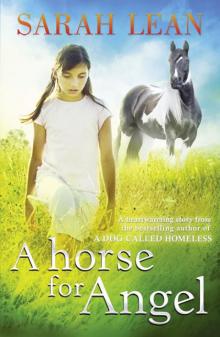 A Horse for Angel
A Horse for Angel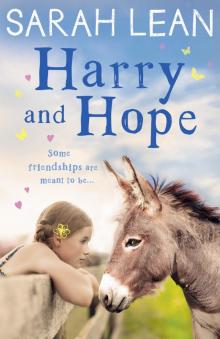 Harry and Hope
Harry and Hope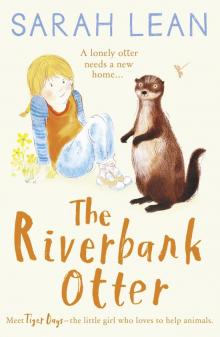 The Riverbank Otter
The Riverbank Otter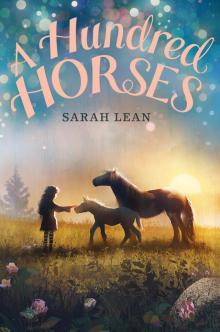 A Hundred Horses
A Hundred Horses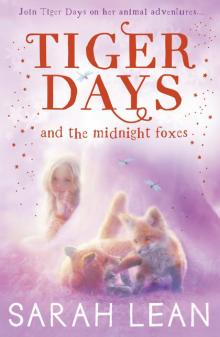 The Midnight Foxes
The Midnight Foxes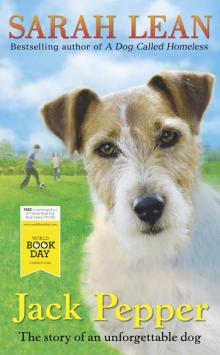 Jack Pepper
Jack Pepper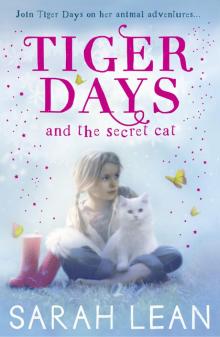 The Secret Cat
The Secret Cat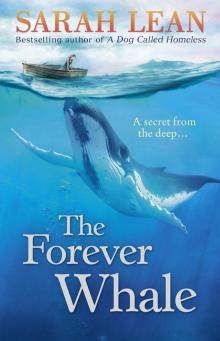 The Forever Whale
The Forever Whale